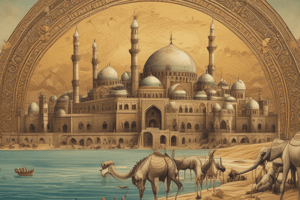Podcast
Questions and Answers
What was the primary role of the Rightly Guided Caliphs after Muhammad's death?
What was the primary role of the Rightly Guided Caliphs after Muhammad's death?
- To enforce Shari'a law strictly across all territories
- To unify the tribes under a single faith (correct)
- To divide the territory into independent tribes
- To establish a monarchy in the Arabian Peninsula
Which group believes that all Muslim rulers should be descended from Muhammad?
Which group believes that all Muslim rulers should be descended from Muhammad?
- Sunni
- Umayyad
- Shi’a (correct)
- Jihadist
What event triggered a crisis for the Muslim community after Muhammad's death?
What event triggered a crisis for the Muslim community after Muhammad's death?
- The declaration of Shari’a law
- The unification of the Arabian Peninsula under Islam
- The assassination of Ali
- The abandonment of Islam by tribes (correct)
How did the Umayyad dynasty impact the early Muslim community?
How did the Umayyad dynasty impact the early Muslim community?
What does the term 'Jihad' primarily signify in the context of early Islam?
What does the term 'Jihad' primarily signify in the context of early Islam?
What was a key feature of the Abbasid rule from AD 750-1258?
What was a key feature of the Abbasid rule from AD 750-1258?
Which of the following best describes the meaning of 'Umma' in Islam?
Which of the following best describes the meaning of 'Umma' in Islam?
What does the term 'Hijrah' refer to in Islamic history?
What does the term 'Hijrah' refer to in Islamic history?
What was the significance of the Ka’aba in the Islamic faith?
What was the significance of the Ka’aba in the Islamic faith?
How did Islamic policy affect non-Muslims living in the empire?
How did Islamic policy affect non-Muslims living in the empire?
Which of the following factors contributed to the expansion of urban areas under the Abbasids?
Which of the following factors contributed to the expansion of urban areas under the Abbasids?
What was central to learning and scholarship during the Abbasid period?
What was central to learning and scholarship during the Abbasid period?
Which of the following is one of the Five Pillars of Islam?
Which of the following is one of the Five Pillars of Islam?
In what manner were scholarly pursuits viewed under Muhammad's teachings?
In what manner were scholarly pursuits viewed under Muhammad's teachings?
What purpose did banks serve in the cities of the Islamic empire?
What purpose did banks serve in the cities of the Islamic empire?
Flashcards
Shari'a
Shari'a
Islamic law based on the Quran, governing family life, morals, business, and community.
Rightly Guided Caliphs
Rightly Guided Caliphs
Successors to Muhammad, using the Quran and his teachings for leadership.
Caliph
Caliph
The successor or deputy to the Prophet Muhammad, leader of the Muslim community.
Jihad
Jihad
Signup and view all the flashcards
Umayyads
Umayyads
Signup and view all the flashcards
Shi'a
Shi'a
Signup and view all the flashcards
Sunni
Sunni
Signup and view all the flashcards
Islamic Empire Crisis
Islamic Empire Crisis
Signup and view all the flashcards
Abbasid Caliphate rule period
Abbasid Caliphate rule period
Signup and view all the flashcards
Islamic religion founder
Islamic religion founder
Signup and view all the flashcards
Umma
Umma
Signup and view all the flashcards
Islamic religion concept
Islamic religion concept
Signup and view all the flashcards
Monotheistic
Monotheistic
Signup and view all the flashcards
The Hijrah
The Hijrah
Signup and view all the flashcards
The Ka'aba
The Ka'aba
Signup and view all the flashcards
People of the Book
People of the Book
Signup and view all the flashcards
Qur'an
Qur'an
Signup and view all the flashcards
Five Pillars of Islam
Five Pillars of Islam
Signup and view all the flashcards
Abbasid Bureaucracy
Abbasid Bureaucracy
Signup and view all the flashcards
Treasures for tracking money
Treasures for tracking money
Signup and view all the flashcards
Military department in Abbasid government
Military department in Abbasid government
Signup and view all the flashcards
Baghdad's role
Baghdad's role
Signup and view all the flashcards
Islamic Taxation
Islamic Taxation
Signup and view all the flashcards
House of Wisdom
House of Wisdom
Signup and view all the flashcards
Ulama
Ulama
Signup and view all the flashcards
Sakks
Sakks
Signup and view all the flashcards
Study Notes
Islamic Empire: Rise and Expansion
- Shari'a: System of Islamic law governing family life, morality, business, and community. Based on the Quran.
- Muhammad's Leadership: Unified the Arabian Peninsula under Islam following a call from the angel Gabriel.
- Rightly Guided Caliphs: Successors of Muhammad who used the Quran and his teachings to lead. Spread Islam through military conquests, seen as a sign of divine support.
- Jihad: Striving, often understood as an inner struggle against evil. Also used to justify expansion.
Islamic Empire: Challenges and Divisions
- Crisis after Muhammad's Death: The Muslim community faced a leadership crisis after Muhammad's death, leading to tribal abandonment of Islam.
- Umayyad Caliphate: Overthrew Ali and moved the capital, abandoning a simple life-style for wealth and ceremony. Caused divisions within the Muslim community. Their religious and political oppression led to their downfall.
- Shi'a and Sunni: Two divisions within Islam. Shi'a believe rulers must be descended from Muhammad; Sunni followers prioritize following Muhammad's example.
Islamic Empire: Structure and Development
- Abbasid Caliphate: Ruled from AD 750-1258. Developed a bureaucracy, established a treasury, and a special department for the army. Consulted religious leaders and taxed land, imports, exports, and non-Muslims.
- Trade Routes: Controlled major sea trade routes (Mediterranean and Indian Ocean) enabling access to trade goods and information. Utilized banks (sakks).
- Agricultural Advances: Developed irrigation techniques and introduced new crops, leading to population growth.
Islamic Empire: Religion and Beliefs
- Islam: Monotheistic religion, centered around a belief in one God (Allah). Founded by Muhammad (AD 570-632).
- Umma: The Muslim religious community.
- Five Pillars: Core duties for Muslims: Faith, prayer (5 times daily facing Mecca), alms giving, fasting during Ramadan, and pilgrimage to Mecca (Hajj).
- Quran: Holy scripture, written in Arabic. Revelations given by the angel Gabriel to Muhammad. Key religious text.
Islamic Empire: Economy
- Attractive Aspects: Islam offered alternatives to the taxes faced by non-Muslims.
- Trade and Commerce: Establishment of banks, sakks. Capital city Baghdad was strategically placed to facilitate trade and access information and goods.
Islamic Empire: Education and Intellectual Pursuits
- Ulama: Learned class in Islam; applied Islamic teachings to daily life.
- House of Wisdom: Center for intellectual exchange and translation of texts from across the world.
- Emphasis on Learning: Muhammad valued learning, Muslims emphasized mathematical, and other scientific discoveries which influenced European scholars during the Renaissance.
Studying That Suits You
Use AI to generate personalized quizzes and flashcards to suit your learning preferences.
Description
Explore the rise and expansion of the Islamic Empire, from Muhammad's leadership to the Rightly Guided Caliphs. Understand the challenges faced by the Muslim community after Muhammad's death and the divide between Sunni and Shi'a. Test your knowledge on key events and figures that shaped this historic period.




